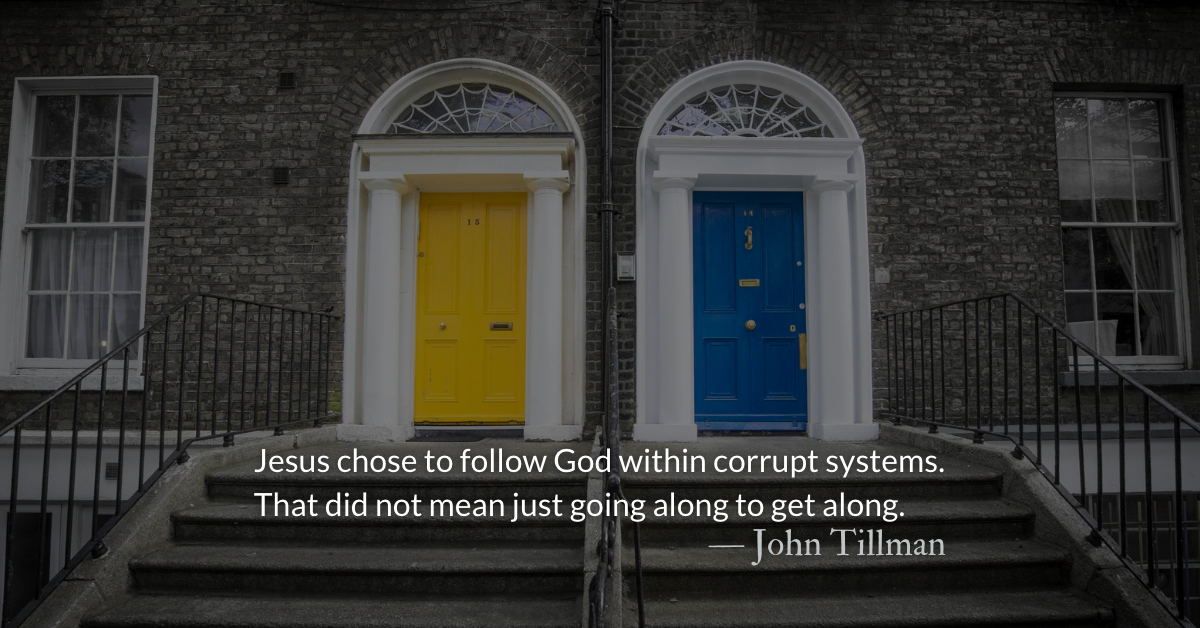Scripture Focus: Mark 12.15-17
15 Should we pay or shouldn’t we?”
But Jesus knew their hypocrisy. “Why are you trying to trap me?” he asked. “Bring me a denarius and let me look at it.” 16 They brought the coin, and he asked them, “Whose image is this? And whose inscription?”
“Caesar’s,” they replied.
17 Then Jesus said to them, “Give back to Caesar what is Caesar’s and to God what is God’s.”
And they were amazed at him.
From John: As we have in prior years, we’ll continue to share a few “bonus” Readers’ Choice posts from time to time this fall. We thank all of you for your responses, your reading, and your support.
Originally published on February 2, 2023, based on readings from Mark 12.
Readers’ Choice posts are selected by our readers:
Jason, Austin, TX — This piece encourages me to think, “How might Jesus respond to some of our polarizing issues today?”
Reflection: False Dilemmas — Readers’ Choice
By John Tillman
A “false dilemma” or “false dichotomy” is an argument that attempts to pressure someone to agree to one of two bad answers. Despite being considered a logical fallacy, it is a commonly used rhetorical device.
The Pharisees and the Herodians were political and theological enemies who came together to pose just such an argument to Jesus.
The Pharisees stressed strict interpretation of the Law. They weren’t revolutionaries but many aspects of Roman rule were despicable to them, including using Roman currency. The denarius bore an image of Caesar, which was forbidden. (Exodus 20.4) It also was stamped, “Caesar is Lord.” To many Jews, even touching a denarius meant participating in blasphemy.
The Herodians were politically minded. Power through Rome was more important than principle. They saw Herod’s dynasty as politically expedient, despite their scandals and being descended from Esau rather than Israel. Herod the Great wanted to be seen as Israel’s messianic king. This is partly why he responded with genocidal violence in his attempt to kill Jesus after his birth.
These warring groups came together with a question intended to condemn Jesus as a political revolutionary or irreligious apostate. “Choose a side,” Jesus, they say.
Jesus refuses.
Questions asked with an impure motive reveal much about the questioner. These questioners were concerned with power and influence, not truth. They were angry about their corruption being exposed, not concerned with moral purity. (Mark 12.12)
I used to read Jesus’ answers as “burns” and “mic drop” moments where he owned his opponents, humiliating them. In our culture, that’s how a “plain reading” sounds. But instead of intending harm, Jesus intended healing. His firm, gracious answers challenged their errors, yet offered a way forward. We may celebrate sick burns but Jesus celebrates merciful healing.
Both the political and religious systems Jesus lived in were corrupt. Jesus chose to follow God within corrupt systems. That did not mean just going along to get along. He challenged religious and political assumptions of everyone, whether Pharisee, Roman, or Samaritan.
Many forces within and without the church pressure us to “choose a side” on many issues. We don’t have to choose from the options offered. False dilemmas are truth-avoidant.
This doesn’t mean that some mushy, non-committal-middle is the right answer. But it does mean that we don’t argue by humiliating our opponents. Like, Jesus, we can offer gracious answers that push for change without pushing people away.
From John: This devotional owes a lot to the And Campaign and their book, Compassion and Conviction. We recommend putting it at the top of your reading list.
Divine Hours Prayer: The Request for Presence
Send our your light and your truth, that they may lead me, and bring me to your holy hill and to your dwelling;
That I may go to the altar of God, to the God of my joy and gladness; and on the harp I will give thanks to you, O God my God. — Psalm 43.3-4
– From The Divine Hours: Prayers for Summertime by Phyllis Tickle.
Today’s Readings
1 Samuel 31 (Listen 2:03)
Revelation 10 (Listen 1:59)
Read more about Gift of Noticing
The other religious leaders lost their objectivity in their attempts to discredit Jesus, the wise teacher found a better path.
Read more about The King We Want
This humble king wasn’t what many wanted. Many rejected Jesus then. And many still reject him now.










